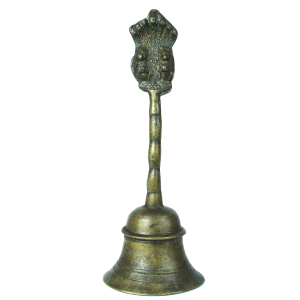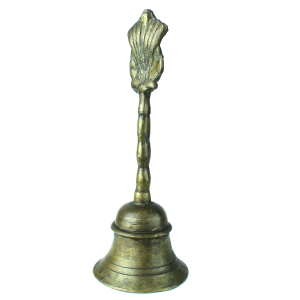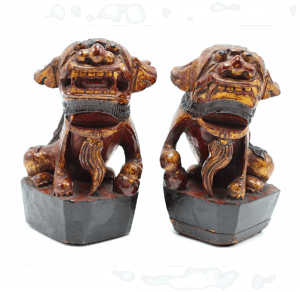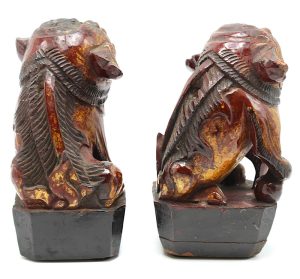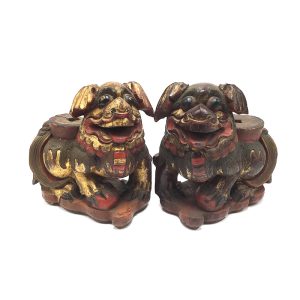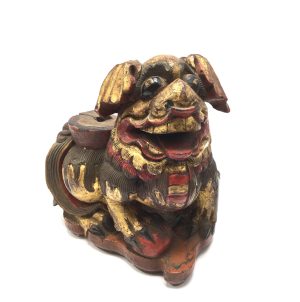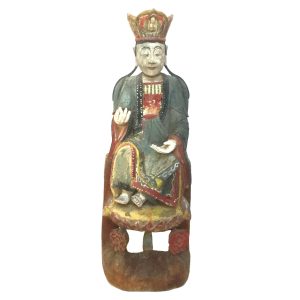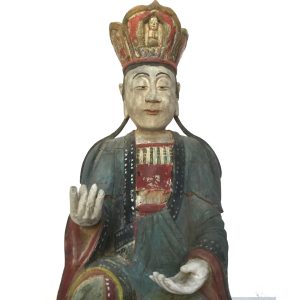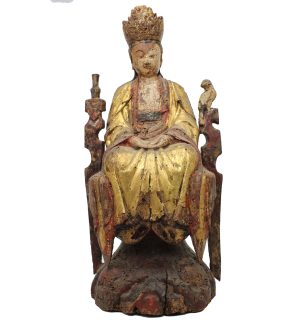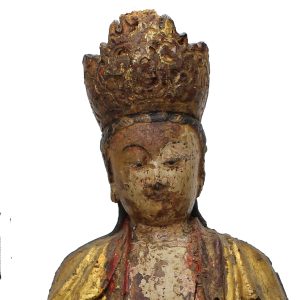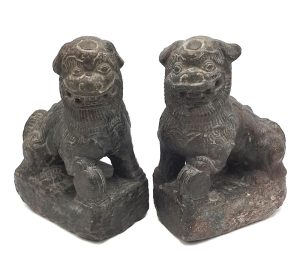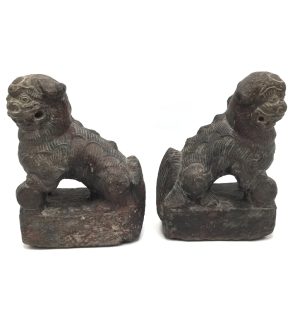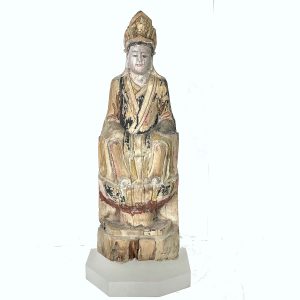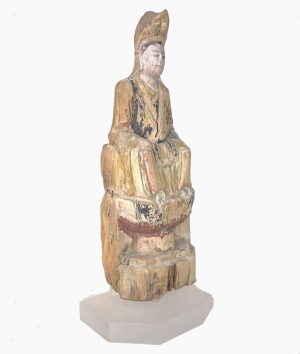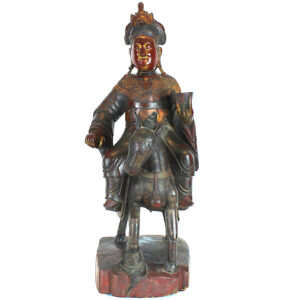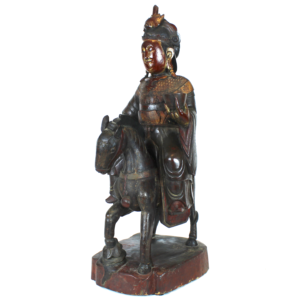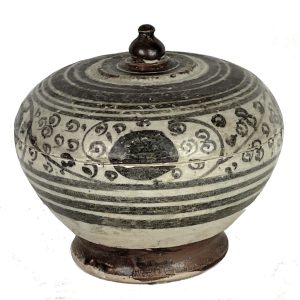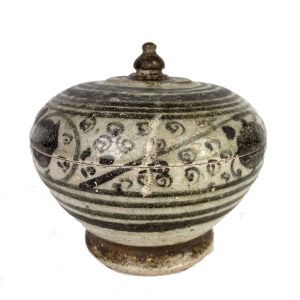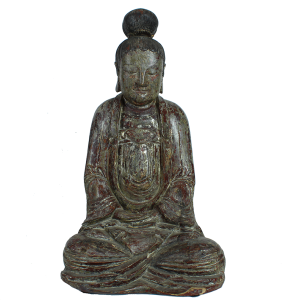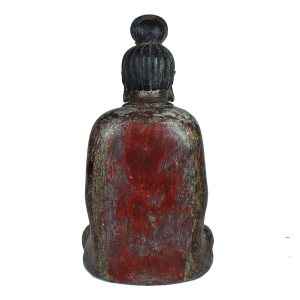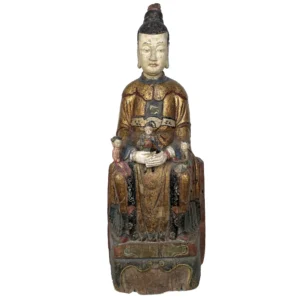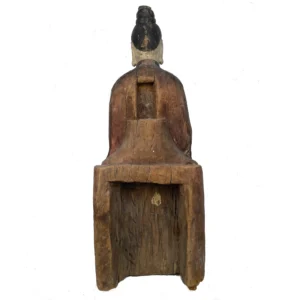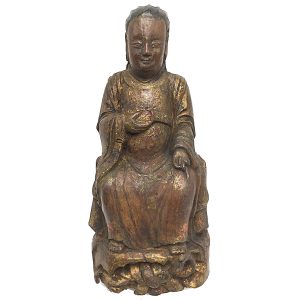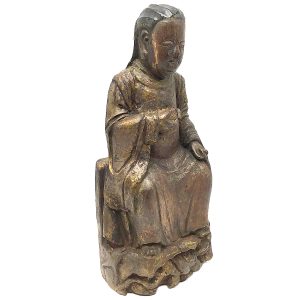Showing 193–204 of 251 results
-
Sale!


$295.00 Original price was: $295.00.$275.00Current price is: $275.00.
H: 10” Dia: 3.75” | FREE SHIPPING within Continental U.S.
Hindu prayer bell used in a temple or home altar for daily puja rituals. Topped by a pair of Garudas and sheltered by Nagas who are natural enemies, but when represented together symbolize peace and serenity of the prayer bell sounds.
-
Sale!


$395.00 Original price was: $395.00.$350.00Current price is: $350.00.
H: 5.75″ W: 3.25″ D: 2.75″ | SOLD
Each of this whimsical gold and red-burgundy lacquered pair of male fu lions sits erect on a high pedestal heads thrown back with flaring ears, bulging eyes, decorative stylized manes and a small bushy tail. Their spirituality is displayed by the pair silently emitting the blessed mantra “aum”: the open mouthed lion forming an “au,” and the other completing it with a closed mouth to form “mmm.” The workmanship on these pieces is masterful, although rustic and provincial, and they are rare with their Buddhist symbolism and because most pairs of fu lions pairs were lost during China’s modernization.
-


$595.00
Whimsical carvings of fu lions were the most popular mythical animals in Chinese homes, especially during the Ming and Qing dynasties, as free standing statues, designs on furniture, architectural elements and functional pieces in private homes or gardens or on a home altar to bring fu and the blessings to the home. This incredibly cute…
-
Sale!


$4,200.00 Original price was: $4,200.00.$3,300.00Current price is: $3,300.00.
H: 31.75″ W: 11.25″ D: 6.5 | CALL 213-568-3030 OR EMAIL [email protected] FOR SHIPPING.
Large provincial Guanyin is natural and modest rather than idealized in relaxed lalitsana pose. Remarkable oversized crown centered with rustic Amitabha on a lotus with pointed aureole. This personalized depiction is a charming, innocent portrayal of a spiritual subject.
-


$1,195.00
One of the most popular Mahayana Pure Land Buddhism depictions of Guanyin, especially during the Ming and Qing dynasties, is Nanhai Guanyin shown here symbolically on a stylized rocky outcrop at her cave at Putuo in meditation (dhyana), legs in padmasana under her robes, flanked by twisted columns one topped by a vial placed on…
-


$695.00
H: 8” W: 5.5” D: 3.25” | SOLD
This is a really great pair of stone small fu lions with lots of character, humor, and detailed carving. Each of these very joyous creatures has open mouthed smiling faces with radiant eyebrows and tufts below their chins, scalloped manes and bushy tails. Carved from one piece of a blackish hard stone they could easily withstand additional wear of the elements in a garden. Pairs of fu lions like this belong in the home of people who appreciate spirituality and wish for happiness and fortune along with a touch of wit and whimsy.
-


$1,375.00
SOLD | H: 23.25″ W: 9.25″ D: 6.5″
This Queen Mother of the West, the highest ranking female Taoist deity was probably displayed as a pair along a statue of Guanyin, the most significant Buddhism female (Guanyin on a Lotus Pedestal (16206B) highlighting the importance and similarity of these revered female images Like the Guanyin, the Queen Mother’s delicately carved face has half closed eyes, serene composure mouth with a hint of a smile, which is more Buddhist than Taoist. Her headdress, centered by her iconic phoenix, rests under a hood extending to her shoulders and back. She wears a high collared three-layered Taoist robe, her hands covered by a ritual cloth.
-
Sale!


$3,600.00 Original price was: $3,600.00.$2,900.00Current price is: $2,900.00.
Ht: 22” W: 8.25” D: 10” | CALL 213-568-3030 OR EMAIL [email protected] FOR SHIPPING.
Magnificent joyful Queen Mother of the West radiant smile, regal jewelry and exquisite attire and striking headdress with phoenix symbolizing the sun. She holds a cup with elixir of immortality, fingers in Taoist karana mudra to cleanse and purify and emanate energy to rid obstacles and unwanted energy.
-
Sale!


$325.00 Original price was: $325.00.$295.00Current price is: $295.00.
Ht. 4.75 Dia 5.25″ | SOLD
Produced in Thai kilns in the 14th to 15th centuries, Sawankhalok glazed stoneware lidded bowls were distributed through southeast Asia along with a variety of larger and smaller items. Lidded bowls like this were used to store many things, especially spices, powders and cosmetics, betel nut chewing materials, and medicine. This bowl rests on a thick foot, has a lid with a brown lotus bud handle and covered with decorative panels of underglaze brown crosshatch and vegetal scrolls.
-


$3,375.00
This exquisite 18th-century statue of the Bodhisattva Guanyin is seated in serene meditation. She is a beautiful young woman, unpretentious yet elegant with smooth, gentle flowing lines that create an air of peaceful spirituality. Every strand of her hair and bun is carved with definition, and in perfect order. The original polychrome and lacquer finish has transformed into a glowing silver hue with a soft patina.
-


$6,500.00
H: 43″ W: 15″ D: 9.75 | SOLD
This large rare vibrant carving is the Taoist Deity of fertility Niangniang (“The Maiden Who Brings Children”) is often confused with Songzi Guanyin. Represented as an empress like figure, she glances serenely at 3 diminutive children, 2 males and a female extending their arms for protection. Stunning and peaceful, it is covered with gold highlights with intricate details.
-
Sale!


$595.00 Original price was: $595.00.$395.00Current price is: $395.00.
H: 12″ W:5.6 ” D:4″ | FREE SHIPPING WITHIN CONTINENTAL U.S.!
Zhenwu, the True Warrior, Perfected Warrior or Northern Emperor was one of the most popular TaoistDeities in the Ming and Qing dynasties known as protector of the state and the imperial family. His feet here rest on a pedestal over a turtle with a lifted head and a snake curled around his shell. Among the many interpretations this represent beings over whom he presided including both celestial officers under his command, [and] former demons that were conquered by him. This is a fascinating carving symbolizes trusted strength. and power.
End of content
End of content

